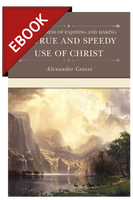
Grosse, Alexander
Description
Alexander Grosse (1596–1654) was an able Puritan minister of presbyterian persuasion who wrote eight influential books from 1632 to 1656, none of which have been reprinted until now.
This book, with its intriguing title about making a speedy use of Christ in every situation, is based on Colossians 2:9–10, “For in him dwelleth all the fullness of the Godhead bodily. And ye are complete in him, which is the head of all principality and power.”
Grosse first sets forth Christ’s fullness as above all created fullness and shows us the emptiness of everything compared to Christ. He contrasts the folly of not cleaving to and contenting ourselves with Christ to the wisdom of valuing Christ above all else. He then expounds how sinners come to Christ and obtain a saving interest in Him.
Next, Grosse stresses how to make use of Christ and how to constantly submit to Him. He stresses the joy of those who are partakers of Christ and shows how believers mature spiritually by communion with Him. Their fullness flows out of apprehending the fullness of Christ. Finally, he expounds four marks that evidence the fullness of believers and provides four motives to labor formore mature fullness in personal spiritual life in and through Christ. Two appendices are added to this excellent, experiential Christ-exalting book—the first on the danger of neglecting Christ and the opportunity of grace and the second on the Lord Jesus as the soul’s sure and last refuge.
Contents
1. Showing the Transcendency of Christ’s Fullness above All Created Fullness
2. Declaring the Vanity of Joining Human Observations to Christ Jesus
3. Disclosing the Folly of Not Cleaving to and Contenting Ourselves with Christ
4. Setting Forth the Beauty of All Divine and Heavenly Fullness in Christ
5. Setting Forth the Folly of Neglecting Christ and Seeking Fullness Elsewhere
6. Discovering the Folly of Not Coming Fully Home to Christ
7. Showing How Christ Is to Be Valued and Esteemed above All
8. Persuading to Come to and Get Interest in Christ
9. Teaching How to Make Use of Christ
10. Persuading to Full and Constant Yielding to Christ
11. Declaring the Inseparable Union of Christ’s Two Natures in One Person
12. Showing That Man’s Choicest Excellency Consists in Union with God
13. Declaring the Perfection and Fullness of Christ Above the Fullness of All Creatures
14. Setting Forth the Superlative Excellency of Christ above All Creatures
15. Opening the Blessed and Happy Condition of Them That Are Partakers of Christ
16. Ascribing Perfection in Christ to Such Alone That Are Truly Blessed
17. Outlining Four Grounds of the Saints’ Perfection
18. Evidencing the Fullness of the Saints by Four Characteristics or Marks, with Four Motives to Labor for Fullness
Appendix 1: The Dolefulness and Danger of Neglecting Christ and the Opportunity of Grace
Appendix 2: The Lord Jesus the Soul’s Last Refuge
Appendix 3: Saint Paul’s Legacy
Endorsement
“Christ was the core theme of the preaching of the English Puritans: Christ as creator, Christ as hater of sin and just judge of unrepentant sinners, Christ as redeemer of those who trust Him, Christ as future loving companion in eternal bliss. This was a vital message that once rang out even from pulpits in the humblest towns and villages of the land. In the seventeenth century, such a place was Bridford in Devonshire, and such a faithful preacher was Alexander Grosse, who has left us a wonderful example of Christ-centered Puritan preaching in this rich little book. Modern readers, like Grosse’s original hearers, are led directly to the risen Christ, shown His glory, shown their need of salvation, and are encouraged to yield to Him in repentance and faith, with added glimpses of heavenly joys to come. Today’s church is truly blessed in having Grosse’s fine work restored to it.” — Stephen Westcott, professor, Reformation International Theological Seminary
About the Author
Alexander Grosse (c. 1596–1654) was a Puritan pastor at Plympton St. Mary, Bridford, and Ashburton, England.